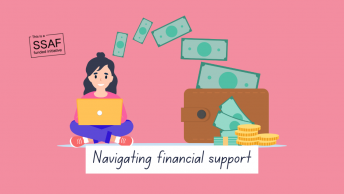This post is over three years old, the information may be outdated.
Uni can leave you feeling the pinch of many costs and fees, including the pressure to save for your future – but never fear, many of your fellow uni students are in the same boat.
While your 20’s is the time of your life to have fun, it is also prime time to create and stick to some good financial habits!
Here are five tips to kick start smart money management:
Create a monthly budget:
This might seem like a pretty obvious piece of advice but by creating and keeping a budget, you will be able to hold yourself accountable for expenses and avoid overspending.
However, be as realistic as possible when it comes to making a budget and try living under your budget for one month before adjusting the numbers where necessary.
Exercise self-control:
Unfortunately, you aren’t going to get anywhere financially without exercising a little bit of self-control when it comes to spending and saving because you aren’t going to have any money!
For many people – myself included – this can be a little difficult but next time you go to buy something on impulse, ask yourself if you really need it.
Start saving now:
Many people think that being young means they have the rest of their lives to save – but let’s not be lulled into a false sense of security. The sooner you start putting away some money for other big financial hurdles, the better.
Whether this be a house deposit or retirement, the sooner you start saving, the more ingrained the habit will become.
Set clear financial goals:
Sit down and define your financial goals and where you’d like to be money wise in weeks, months and years down the track.
By doing this, you’ll be able to prepare for your future and it will make budgeting and saving a whole lot easier as you will know what your savings are going towards.
Emergency money:
Having a financial safety net is important and whilst most people think long term, it’s also helpful to think and save for the short term, especially if something unfortunate or inconvenient happens.
Whether it’s a major health crisis or something as simple as an unexpected bill, having an emergency fund will provide that peace of mind.










